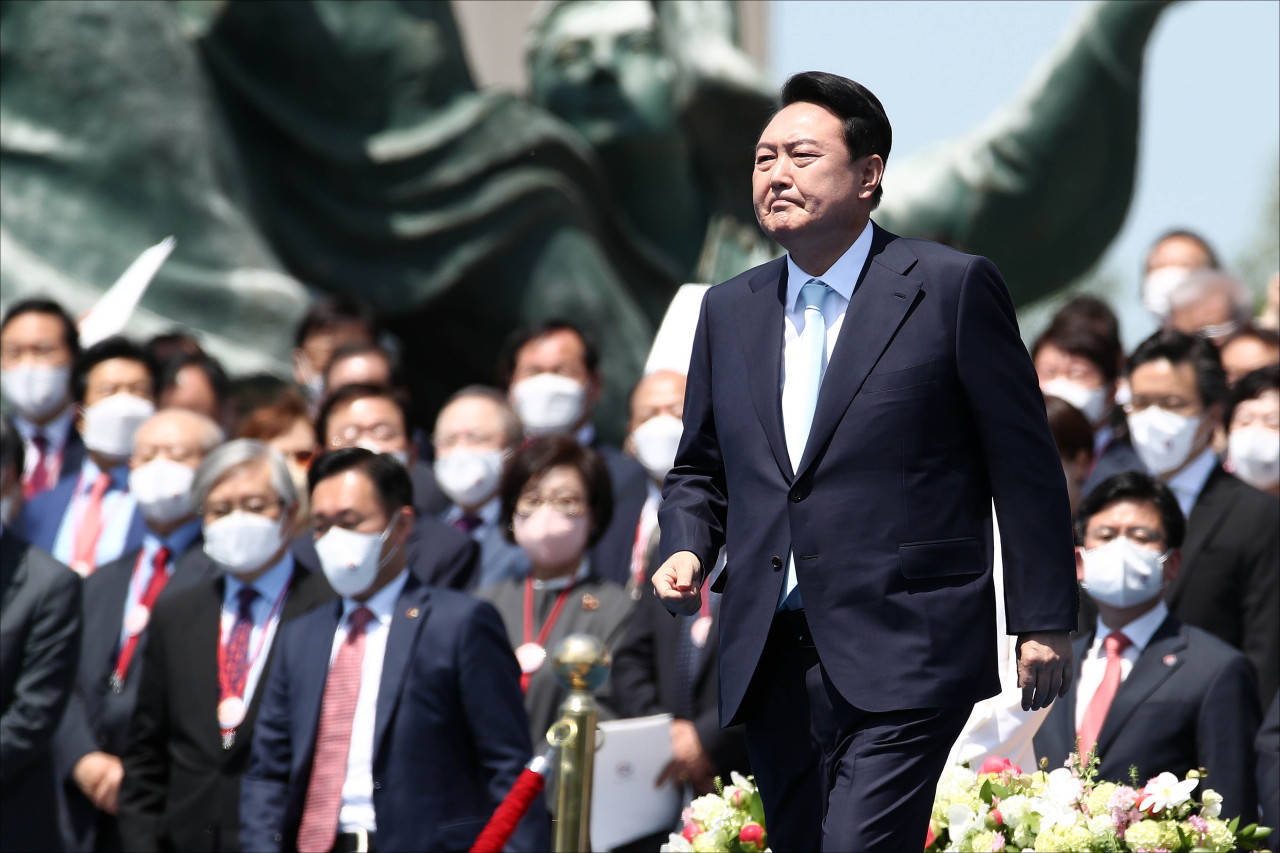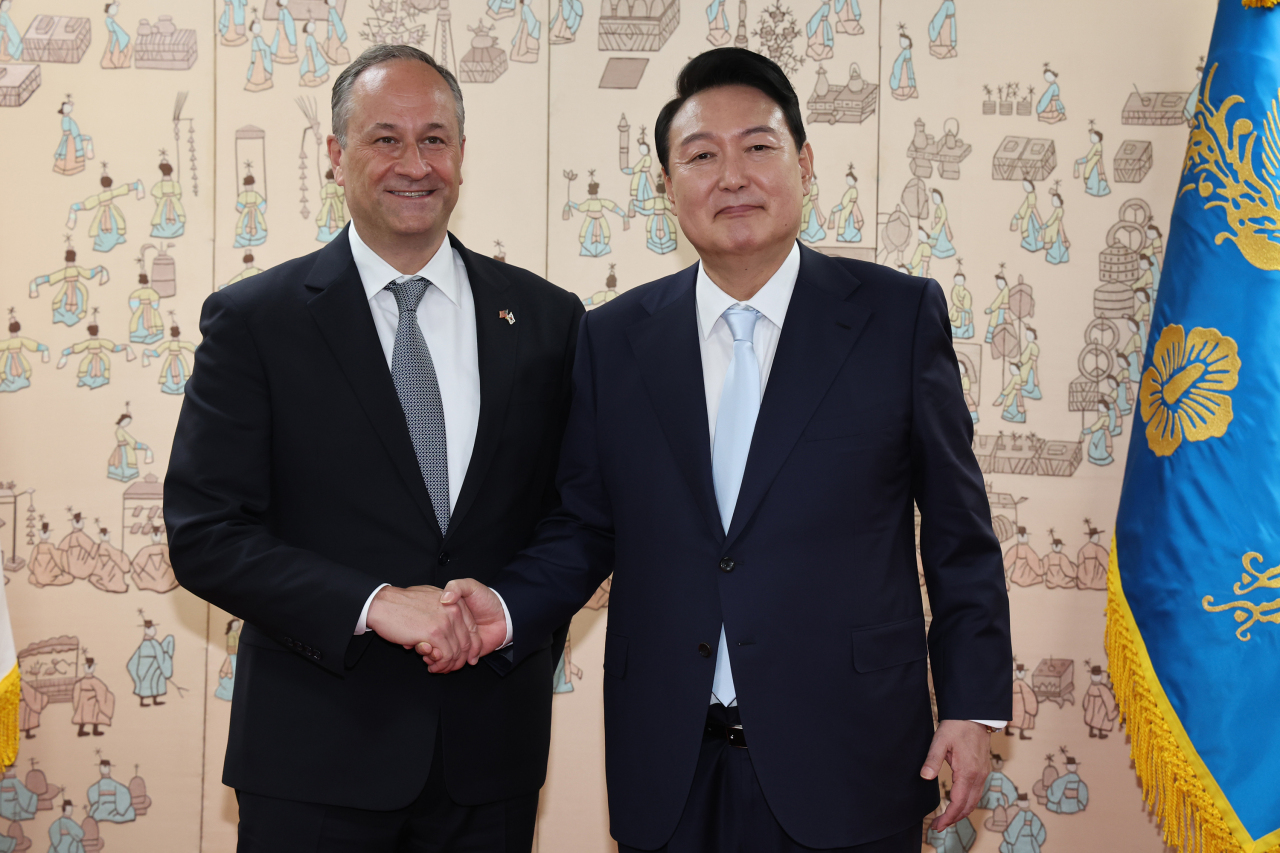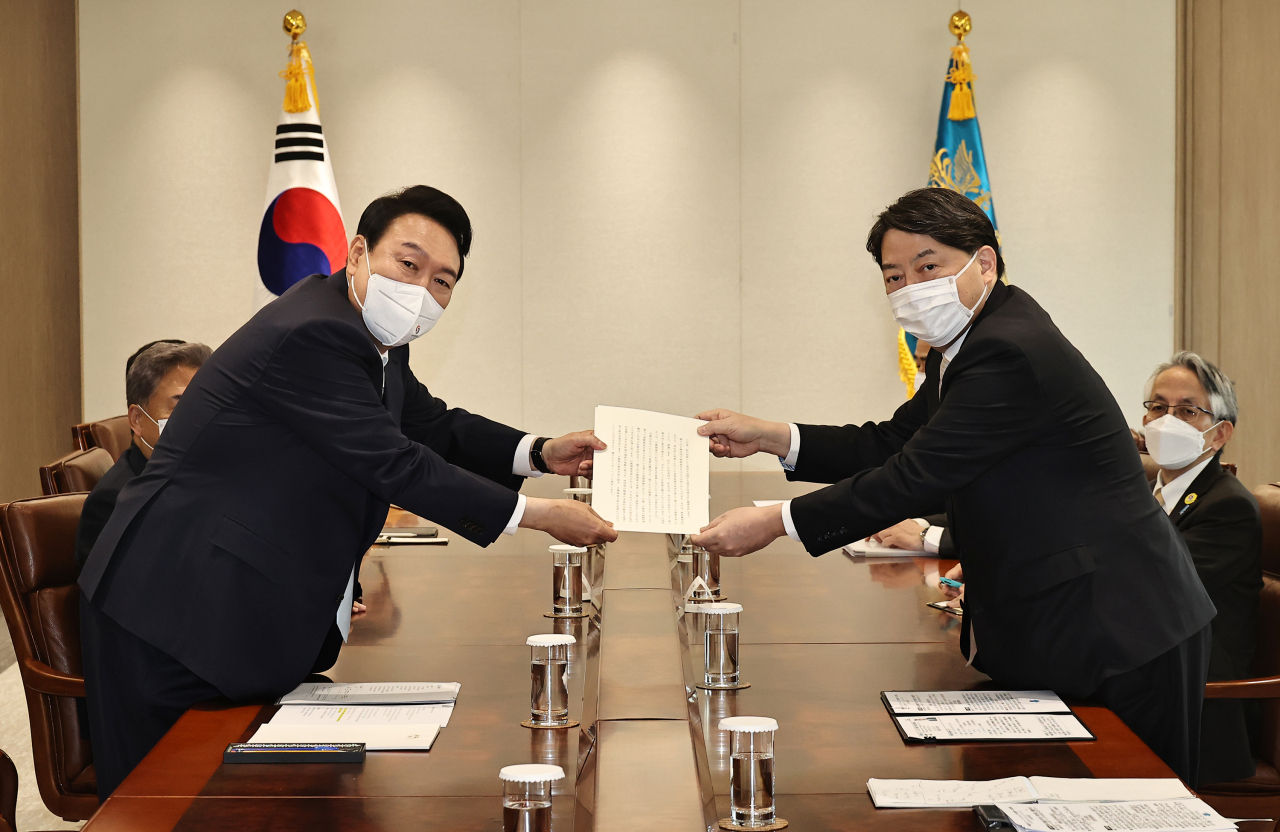 |
South Korean President Yoon Suk-yeol attends his presidential inauguration ceremony held at the National Assembly on Tuesday. (Yonhap) |
South Korea’s new president, Yoon Suk-yeol, begins his term with more difficult challenges on the diplomacy and security fronts amid the fast-changing world order and increasing North Korean threats.
As a conservative, Yoon has presented a foreign policy that would reorient the country toward closer ties with the United States, and take a hard-line approach in dealing with North Korea and its missile provocations -- shifting the course from the one that his liberal predecessor, Moon Jae-in, took.
But he would need to establish strong and detailed principles to handle the challenges ahead, with one of the greatest being how he will strike a balance between the United States and China -- the former, South Korea’s key military ally and the latter, its biggest trading partner -- experts say.
The strategic competition between the United States and China is escalating to a zero-sum game, and South Korea would likely be pressured to take sides, just as other countries would be, Park Won-gon, a professor of North Korean studies at Ewha Womans University told The Korea Herald.
“Former President Moon Jae-in took a ‘strategic’ stance (toward the US and China), but that approach is too difficult to make work. (Yoon) will face a situation where he would have to make a decision to take one side,” Park said.
 |
South Korean President Yoon Suk-yeol shakes hand with US second gentleman Douglas Emhoff at the new presidential office in Yongsan-gu, Seoul, Tuesday. (Yonhap) |
Yoon would have to deal with the unfavorable consequences that would likely follow, but making a decision is a better way to handle the situation than being ambiguous, so he should lay down a strategy ahead of time, Park said.
The increasing security threats from North Korea also stand as a major problem the new president has to tackle.
In addition to the usual vitriolic attacks against South Korean presidents, Pyongyang has been ramping up testing of nuclear arsenal, having already launched its 15th missile this year.
In his inauguration speech Tuesday, Yoon underscored the importance of maintaining “sustainable peace,” and called for North Korea to return to the negotiating table for denuclearization, while promising the North extensive economic support in return.
“While North Korea’s nuclear weapon programs are a threat not only to our security and that of Northeast Asia, the door to dialogue will remain open so that we can peacefully resolve this threat,” Yoon said during the inauguration ceremony held in the National Assembly compound.
“If North Korea genuinely embarks on a process to complete denuclearization, we are prepared to work with the international community to present an audacious plan that will vastly strengthen North Korea’s economy and improve the quality of life for its people.”
While there are speculations that Pyongyang is ramping up its missile provocations in protest over the advent of a more hawkish government in Seoul, Park, the professor, ruled out those claims.
The series of military actions Pyongyang conducted is only part of its plan to become a nuclear state, and this would present a very difficult problem for the Yoon administration to handle, Park said.
Cheong Seong-chang, director of the Center for North Korean Studies at Sejong Institute, agreed there is “zero” chance that North Korea will accept Yoon’s proposal of denuclearization in trade for economic benefits, because the reclusive regime has long demanded that Seoul withdraw “hostile” North Korean policies, and to stop joint military exercises with the United States.
Pyongyang’s ratcheting up of its nuclear ambitions this year is seen from not only the increased number of test firings -- the regime conducted four tests in 2020 and eight in 2021 -- but also signs that it is preparing to conduct its seventh nuclear test.
According to US military and intelligence agencies, North Korea may conduct an underground nuclear testing this month as assessed from a commercial satellite imagery of the Punggye-ri nuclear test site.
The nuclear test could be carried out around the time US President Joe Biden visits Seoul and Tokyo later this month, and it would be the first in nearly five years.
What also adds to the tension on the Korean Peninsula is that, the North tested what it revealed as a “new type of tactical guided weapons system,” a tactical weapon that would pose a direct threat to Seoul.
In the 15 cases of its show of force this year, Pyongyang also launched what is believed to be an intercontinental ballistic missile thought to be capable of hitting the mainland US, which comes in five years since the last time in 2017.
 |
South Korean President Yoon Suk-yeol receives Japanese Prime Minister Fumio Kishida's personal letter, delivered from the Japanese Foreign Minister Yoshimasa Hayashi at the new presidential office in Yongsan-gu, Seoul, Tuesday. (Yonhap) |
As the conservative president is making efforts to bolster the alliance with the United States, in part to deter the North’s nuclear advancement, Yoon’s office is also tasked with reviving the long-strained relations with Japan.
While South Korea’s relationship with the neighboring country often goes through ups and downs, they have been at a low ebb for some time, as the former Moon Jae-in administration clashed with Japan over a series of issues stemming from their shared history.
Compared to the other issues, resetting the fraught ties might be an easier task for Yoon, Park of Ewha Womans University said, as both leaders of the two countries have shown a determination to do so.
For the first time in four years, Japan sent Foreign Minister Yoshimasa Hayashi to attend Yoon’s inauguration ceremony.
After the inauguration ceremony, Yoon and Hayashi met at the new presidential office in Yongsan, Seoul. Hayashi delivered a letter from Japanese Prime Minister Fumio Kishida to Yoon.
Arriving early Monday, Hayashi had dinner with Rep. Park Jin, Korea’s foreign minister nominee who is awaiting confirmation from the National Assembly, to discuss ways to improve bilateral relations.
There, Park and Hayashi agreed to quickly push for high-ranking official meetings to resolve differences between the countries on a plethora of issues, such as the South Korean court ruling ordering a Japanese company to compensate Koreans for forced labor during the Japanese colonial period.
The two sides have yet to discuss on measures to resolve the specific issues that come in between them in the recent encounters, but they did agree on the need for cooperation, a foreign ministry official explained.
Together with Japan and the United States, South Korea also made the request for an emergency meeting of the United Nations Security Council to discuss North Korea’s latest missile launches, according to a Foreign Ministry official here.
By Jo He-rim (
herim@heraldcorp.com)










![[Today’s K-pop] Blackpink’s Jennie, Lisa invited to Coachella as solo acts](http://res.heraldm.com/phpwas/restmb_idxmake.php?idx=644&simg=/content/image/2024/11/21/20241121050099_0.jpg)